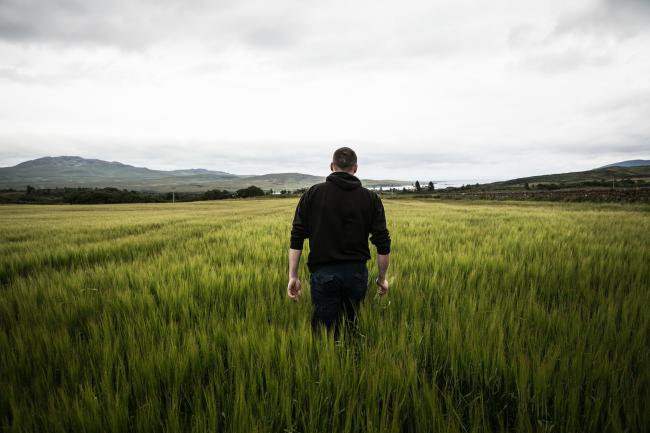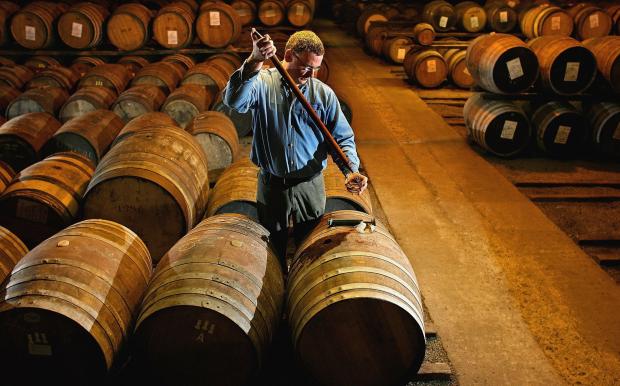
HERALD EVENT
Barley fields utilised by Bruichladdich will benefit from new farming techniques with the aim of meeting Scotland’s net zero targets
With whisky producers increasingly aware of their contribution to emissions from Scotland’s farming sector, Islay distiller Bruichladdich is looking forward to sharing its natural approach to meeting net zero targets at the forthcoming free online CENSIS conference. By Andrew Collier.
THERE is probably no more powerful image of a sustainable Scotland than the whisky industry. A natural product, produced in harmony with the land in picturesque rural distilleries, it presents a compelling and attractive visual and economic impression.
The industry has long taken advantage of this unique branding, but it is now doing more than ever before to ensure that its environmental actions match its rhetoric. One producer, Bruichladdich, has taken a novel path in order to support itself, local farmers and, ultimately, the consumer.
“About 20 years ago we decided that we really wanted to put the community back at the heart of the business,” explains Lynne McEwan, the company’s Global Marketing Manager.
“At the same time, we were interested in bringing the principles of ‘terroir’ – the French winemaking notion that where something grows impacts the flavour – to whisky.
“We also wanted to make sure that as much of the business as possible that could be done on Islay would be done on Islay.”
The company started by looking at barley – the only ingredient allowed in the production of malt whisky. “So we started exploring its flavour along with how it is grown and where.
“Whisky is actually an agricultural product and when you accept that, you realise that you are in the farming business. So we moved away from the traditional model of directly sourcing the raw ingredient and started working directly with farmers.
“In doing that, we started to learn about the challenges of growing barley and of farming and we wanted to be part of a different system – one that produced a more flavourful and nutritious product and that gave value to the farmer. We also realised that it would be better for the environment in terms of the soil and of keeping ground covered.”
Ms McEwan – who will be participating in the forthcoming conference being organised by CENSIS, Scotland’s Innovation Centre for sensing, imaging and the Internet of Things, in association with The Herald – says Bruichladdich is now working with about 30 different partners to obtain its barley.
“Some of it is organic, some is biodynamic and some is conventionally produced. About 50 per cent of our barley needs now come from the island – we started with one farmer in 2004 when this was a community on the edge. There were no new distilleries coming along and the creamery had closed at a time when most of the farmers had dairy herds to supply it.
“We asked one farmer if he would grow barley for us – it was only produced locally at the time for cattle feed so wasn’t seen as a valuable crop – and we said we would pay him and add value as we wanted to know what it tasted like.”
Production on Islay has now grown to the point where 20 individual farmers are involved. “It’s meant diversification for them and really takes the value from the distillery gate right into the community. That and capturing the flavour of the islands are things that we have always felt very strongly about.”
The initiative has also sparked off partnerships with academics and others. These include a relationship with the University of the Highlands and Islands to grow beer barley on Orkney.
“It’s very interesting as it’s genetically a very different type of barley varietal. If we want to look for food security in the future, we have to keep genetic diversity. Creating a market allows a different system to be created.”
With barley being such a critical component of malt whisky, it begs the question of why growing it locally on Islay has not been done before.
The reason, Ms McEwan explains, is because it presents a huge challenge. “Growing it is actually really hard here. The yields are lower and you may have a terrible growing season. The fact that we have geese and deer also creates a barrier.
“However, we changed our mindset and decided to do so because we think it’s really important for the flavour and for the diversification.
“We will work to different parameters – a higher moisture content that other distillers wouldn’t normally accept, for example – because it’s good for the community.”
The farmers on Islay grow conventional rather than organic crops, but they are looking to reduce their inputs. “One farmer here has been growing rye for the last couple of years – it’s a rotational crop that improves the soil. That means less cost to him, and there’s a market at the end of it.
“It’s a case of working together to understand the challenges and supporting farmers in their journey to have more sustainable options.”
Bruichladdich now has a policy of working to, as it puts it, “reconnecting land, community and dram”.
“It’s a holistic process, thinking about the impact on the island on everything from the soil to the way we bottle and ship.
“We have made a commitment to decarbonise our distilling operations to Scope One level by 2025. We are also undertaking several feasibility studies so that we can understand what the right options for us are.”
The results of phase one of a hydrogen study are awaited and the distillery is also looking into solar and wind.
“It’s likely that there will be no one solution that serves all our needs and allows us to meet our targets.
“We are also having discussions along the supply chain about things like our glass so there will be less carbon in the production and using more recyclable materials in our shipments around the world. There is a lot to be done and we are very much on a journey.”
The company’s values and purpose have led to it being awarded certified B Corp status, meaning it meets the highest standards of verified social and environmental performance, public transparency and legal accountability to balance profit and purpose.
Bruichladdich is also committed to sharing its learning with other distillers and with the community where it can.
“We want to make sure that we come up with island-wide solutions – we are only going to achieve real systemic change when we all work on this together.
“Part of the difficulty of being on a beautiful and remote island is that it’s a beautiful and remote island.
“That makes the infrastructure here so much more complicated and any investment needs to be much more significant.
“We have to think about things like how we move the energy, how we capture and store it and how we connect to the grid. Being on an island makes that significantly more difficult.”
The really important thing at the end of the day, Lynne McEwan says, is that the final product should taste delicious. “The consumer has to have something really wonderful to drink.
“We want them to taste something and day that it’s incredible, but at the same time know how it was produced and that it has spent its entire life on the island.
“If you can do that, we are educating them as well. Then when they make buying decisions, they can choose a different type of system that supports every link in the chain.”
===================================================
Industry has mature outlook on net zero
ACROSS Scotland, the whisky sector recognises its place in the natural landscape and the huge importance of sustainability.
It developed its environmental strategy back in 2009 and is working to achieve net zero by 2040 – five years ahead of the Scottish Government’s own target.
According to the Scotch Whisky Association, by then the industry should no longer be reliant on fossil fuels but instead be using renewable sources. Many distilleries should be self-sufficient in energy and some will be biorefineries, using by-products to create raw materials for other sectors.
Water will be used efficiently – for instance, by capturing the energy stored in it during the distillation process. The finished product will be transported either by rail or in electric vehicles, using a rapid charging network. This will also help tourists to visit, boosting trade further.
Barley and cereals will be resistant to the changing climate and new farm management techniques will help local ecosystems to thrive. The industry also intends to work with agricultural partners to explore how it can ensure that production of these crops achieves net zero status.

The ambition is to send a clear signal that it is working proactively to significantly reduce greenhouse gas emissions from barley production and from other key cereals used in the sector.
Packaging will also become fully recyclable to give it a second life and materials will be sustainably sourced. The glass bottles used will be fired using renewable energy and will be lighter. Casks, too, will be refilled several times.
The industry also plans to extract peat responsibly. This accounts for just 1 per cent of the total extracted in the UK, but it plans to play an active role in conserving and restoring Scotland’s peatland by 2035.
The Scotch Whisky Association says: “We can’t pretend that achieving our vision will be easy – this is a project that will take many years. Some of the solutions and the technology we need to succeed don’t even exist yet.
“But we cannot delay. We started our journey in 2009 and now we will accelerate it.”
====================================================
Take part in CENSIS event
ON Tuesday, October 26 key figures from more than 20 different organisations will be taking part in a special one day, online conference, hosted by The Herald, which will explore the potential of a net zero carbon transition to create a healthier, wealthier and more equal society.
As part of ‘Scotland’s Contribution to COP26: a joined-up Just Transition’, speakers from science, technology, government and other sectors will examine not only the speed and scale at which Scotland must move if it is to tackle the climate emergency, but also to spell how important it is that, as society reshapes to meet the challenge, that no-one is left behind.
To be part of this exciting event, visit www.newsquestscotlandevents.com/events/cop26-just-transition/

